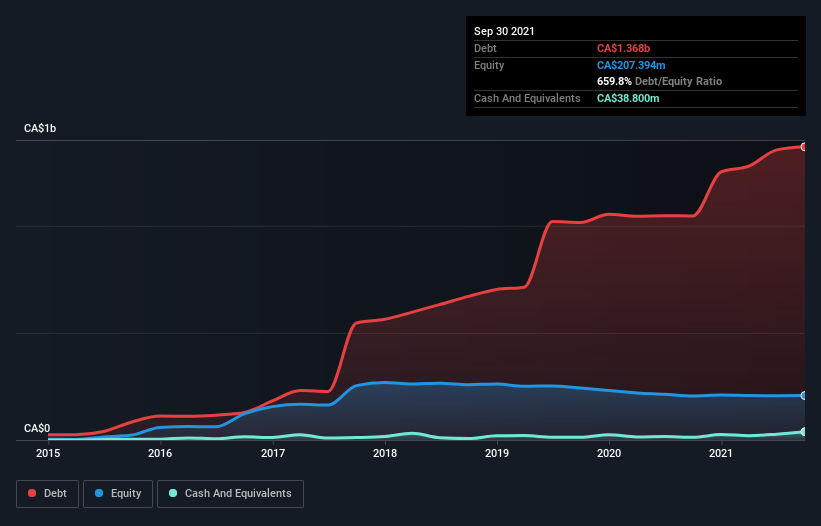
Legendary fund manager Li Lu (who Charlie Munger backed) once said, 'The biggest investment risk is not the volatility of prices, but whether you will suffer a permanent loss of capital.' When we think about how risky a company is, we always like to look at its use of debt, since debt overload can lead to ruin. As with many other companies StorageVault Canada Inc. (CVE:SVI) makes use of debt. But is this debt a concern to shareholders?
What Risk Does Debt Bring?
Debt is a tool to help businesses grow, but if a business is incapable of paying off its lenders, then it exists at their mercy. Ultimately, if the company can't fulfill its legal obligations to repay debt, shareholders could walk away with nothing. However, a more usual (but still expensive) situation is where a company must dilute shareholders at a cheap share price simply to get debt under control. Of course, plenty of companies use debt to fund growth, without any negative consequences. The first thing to do when considering how much debt a business uses is to look at its cash and debt together.
View our latest analysis for StorageVault Canada
What Is StorageVault Canada's Debt?
As you can see below, at the end of September 2021, StorageVault Canada had CA$1.37b of debt, up from CA$1.05b a year ago. Click the image for more detail. However, because it has a cash reserve of CA$38.8m, its net debt is less, at about CA$1.33b.

A Look At StorageVault Canada's Liabilities
We can see from the most recent balance sheet that StorageVault Canada had liabilities of CA$16.9m falling due within a year, and liabilities of CA$1.49b due beyond that. Offsetting this, it had CA$38.8m in cash and CA$4.07m in receivables that were due within 12 months. So it has liabilities totalling CA$1.46b more than its cash and near-term receivables, combined.
StorageVault Canada has a market capitalization of CA$2.50b, so it could very likely raise cash to ameliorate its balance sheet, if the need arose. But we definitely want to keep our eyes open to indications that its debt is bringing too much risk.
We measure a company's debt load relative to its earnings power by looking at its net debt divided by its earnings before interest, tax, depreciation, and amortization (EBITDA) and by calculating how easily its earnings before interest and tax (EBIT) cover its interest expense (interest cover). This way, we consider both the absolute quantum of the debt, as well as the interest rates paid on it.
Weak interest cover of 0.33 times and a disturbingly high net debt to EBITDA ratio of 13.1 hit our confidence in StorageVault Canada like a one-two punch to the gut. The debt burden here is substantial. The silver lining is that StorageVault Canada grew its EBIT by 815% last year, which nourishing like the idealism of youth. If it can keep walking that path it will be in a position to shed its debt with relative ease. When analysing debt levels, the balance sheet is the obvious place to start. But ultimately the future profitability of the business will decide if StorageVault Canada can strengthen its balance sheet over time. So if you're focused on the future you can check out this free report showing analyst profit forecasts.
Finally, a company can only pay off debt with cold hard cash, not accounting profits. So we clearly need to look at whether that EBIT is leading to corresponding free cash flow. Happily for any shareholders, StorageVault Canada actually produced more free cash flow than EBIT over the last two years. That sort of strong cash conversion gets us as excited as the crowd when the beat drops at a Daft Punk concert.
Our View
We weren't impressed with StorageVault Canada's net debt to EBITDA, and its interest cover made us cautious. But like a ballerina ending on a perfect pirouette, it has not trouble converting EBIT to free cash flow. When we consider all the elements mentioned above, it seems to us that StorageVault Canada is managing its debt quite well. But a word of caution: we think debt levels are high enough to justify ongoing monitoring. The balance sheet is clearly the area to focus on when you are analysing debt. But ultimately, every company can contain risks that exist outside of the balance sheet. These risks can be hard to spot. Every company has them, and we've spotted 2 warning signs for StorageVault Canada (of which 1 is a bit unpleasant!) you should know about.
If you're interested in investing in businesses that can grow profits without the burden of debt, then check out this free list of growing businesses that have net cash on the balance sheet.
New: Manage All Your Stock Portfolios in One Place
We've created the ultimate portfolio companion for stock investors, and it's free.
• Connect an unlimited number of Portfolios and see your total in one currency
• Be alerted to new Warning Signs or Risks via email or mobile
• Track the Fair Value of your stocks
Have feedback on this article? Concerned about the content? Get in touch with us directly. Alternatively, email editorial-team (at) simplywallst.com.
This article by Simply Wall St is general in nature. We provide commentary based on historical data and analyst forecasts only using an unbiased methodology and our articles are not intended to be financial advice. It does not constitute a recommendation to buy or sell any stock, and does not take account of your objectives, or your financial situation. We aim to bring you long-term focused analysis driven by fundamental data. Note that our analysis may not factor in the latest price-sensitive company announcements or qualitative material. Simply Wall St has no position in any stocks mentioned.
About TSX:SVI
StorageVault Canada
Owns, manages, and rents self-storage and portable storage space to individual and commercial customers in Canada.
Mediocre balance sheet with concerning outlook.
Market Insights
Community Narratives



